 Healing, even when it takes place, is never an end in itself; it is opening, the pointing to a new road which now opens up before us. This is because thanksgiving, praise or – even – following Christ are indicative signs of a ‘beyond’ towards which one must go. A sick person must now understand that he or she must overcome an excessive attention on his or her own part to transitory possessions in order to transcend himself or herself; he or she must, that is to say, ‘move out of himself or herself’ and find his or her centre in the Lord, because ‘our peace lies in His will’ and only in ‘losing one’s life for love of him will one find it again’. A prayer of invocation and supplication, therefore, tends to develop into the highest prayer of admiration, of praise, of the worship of God and of following Christ: God – and His holy will – is much more important than we are. It is this belief that should be lived and assimilated in this kind of prayer.
Healing, even when it takes place, is never an end in itself; it is opening, the pointing to a new road which now opens up before us. This is because thanksgiving, praise or – even – following Christ are indicative signs of a ‘beyond’ towards which one must go. A sick person must now understand that he or she must overcome an excessive attention on his or her own part to transitory possessions in order to transcend himself or herself; he or she must, that is to say, ‘move out of himself or herself’ and find his or her centre in the Lord, because ‘our peace lies in His will’ and only in ‘losing one’s life for love of him will one find it again’. A prayer of invocation and supplication, therefore, tends to develop into the highest prayer of admiration, of praise, of the worship of God and of following Christ: God – and His holy will – is much more important than we are. It is this belief that should be lived and assimilated in this kind of prayer.
Some characteristics of prayers of supplication
First of all we are struck by the vehemence, the intensity and the stubbornness that characterise this kind of prayer. In these circumstances man is totally ‘directed’ towards God, stretched out towards Him, and perceives that he depends radically on Him. For this reason, he truly prays to him ‘with all his heart, all his soul and all his strength’. He himself becomes ‘in-vocation’, totally stretched our towards God: ‘As a servant depends on his master, as a maid depends in her mistress, so we will keep looking to you, O Lord our God’ (Ps 123:2).
For this reason, he ‘cries out’ to God not now and then, in varyingly attentive and distracted ways, but ‘day and night’ (Lev 18:7). He cannot do without this relationship, ‘from dawn’, ‘like a waterless land’ (Ps 63), like ‘a deer longs for water’ (Ps 42). ‘It is above all else the trials’ that teach us to pray, wrote Jean Lafrance, a famous teacher of prayers who recently died. Lafrance believed that he began to truly pray only when, afflicted by a tumour, he discovered ‘prayer of supplication’. We are never immersed enough in hopelessness to cry out to God: a cry that comes from our depths is always answered…Because only the person who is always in trial and tribulation is persevering in prayer, he or she always prays without ever tiring…And it is the Spirit that is behind these events – it is he who, unknown to us, places us in conditions where we can do nothing else but pray.
This reminds us of the episode that is narrated in ‘Sayings of the Fathers of the Desert’ where we read of a young man who asked his elderly teacher to teach him how to pray. His teacher looked at him with a certain surprise, between incredulity and admiration. Then, rather than losing himself in words, he took the young man to a pool of water, he asked him to bend down in front of it, and with a resolute hand and a strength that one would not have believed existed within him he put the young man’s face underwater and kept him there for a long period of time while the boy thrashed around. Finally, he drew him out of the water and said to the young man who, amazed, had asked him ‘what’s going on? I ask you to teach me to pray and you try to drown me?’, ‘what did you want while I kept you underwater’. The young man: said ‘I was trying to breathe!’ ‘There you are’, answered the old man, ‘until you have turned to God with all of yourself, as you then sought air, trying to break free of my grip because you thought you were dying, do not believe that you are truly looking for God’.
It is true that in illness man is called to live in a singular way the ‘passive’ dimension of his existence: he no longer enjoys that autonomy that he had with so much labour 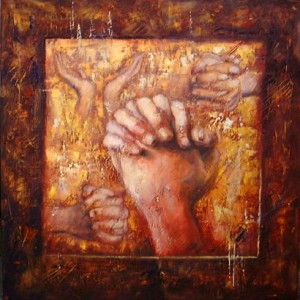 acquired moving towards adulthood. But if one sees things in their true perspective, is not the Christian life first of all a gift, the gift that God makes of Himself – of His own life – to man? Thus first of all it is welcome, receptivity. Only subsequently is it also self-giving, in a movement of returning the gift that has been received. ‘Every activity that deserves to be called Christian’, writes Father H. De Lubac, ‘necessarily takes place against a background of passiveness’, and illness can help us to understand and accept this situation, which is otherwise so difficult to share. Today it appears that we are all taken by this movement, by things that have to be done, by activity, by initiative and by the taking on of responsibility, such that stopping for a while and welcoming, being with our hands and our spirit ready – which is what prayer is – seems almost to be a death!
acquired moving towards adulthood. But if one sees things in their true perspective, is not the Christian life first of all a gift, the gift that God makes of Himself – of His own life – to man? Thus first of all it is welcome, receptivity. Only subsequently is it also self-giving, in a movement of returning the gift that has been received. ‘Every activity that deserves to be called Christian’, writes Father H. De Lubac, ‘necessarily takes place against a background of passiveness’, and illness can help us to understand and accept this situation, which is otherwise so difficult to share. Today it appears that we are all taken by this movement, by things that have to be done, by activity, by initiative and by the taking on of responsibility, such that stopping for a while and welcoming, being with our hands and our spirit ready – which is what prayer is – seems almost to be a death!
This is because prayer must then lead to decentralisation, to going out of ourselves and moving towards God and our neighbour. And this requires interior transformation, change and conversion. But there is no transformation or change or conversion without purification, without, that is to say, detachment from ourselves, without ceasing to be worried about ourselves. The very condition of illness can constitute a call to review one’s own life, to scale very many things down. Now we realise how many fatuous things we pursued and how we neglected the essential. From the point of view of the Gospel, this means that ‘time has been given to us to use it in the only work that is needed in life, that work to which Jesus alluded when answering Martha who asked him to shift Mary away from her inaction: ‘One thing alone is necessary…’ ‘The only work that is needed is that of making God the centre of our thoughts and our lives…Then we begin to understand that God, to form life inside us, places us in front of things that pass and things that do not pass…We begin to understand that in our choices we must not allow ourselves to be guided by what appears, or by our feelings and emotions. We must, rather, learn to go beyond ourselves, to go beyond our impressions. It is specifically this need to go beyond ourselves that opens up to us the road of our interior lives’ (L. Bracco).








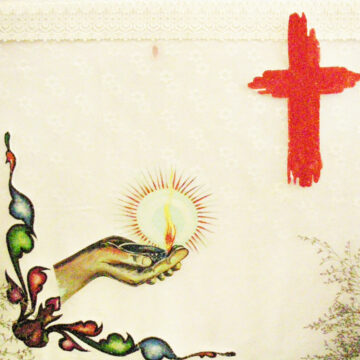
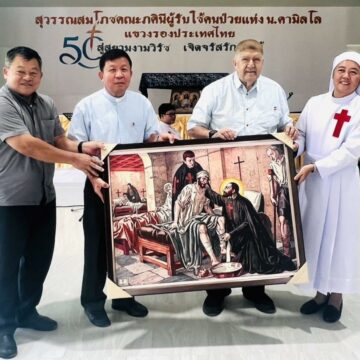
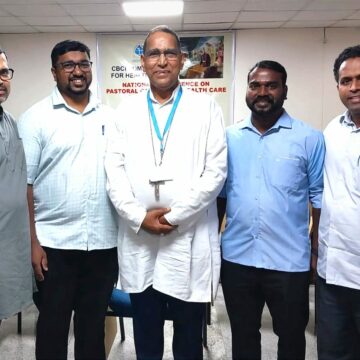


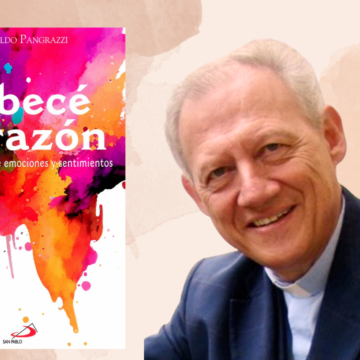
Camillians on Facebook
Camillians on Twitter
Camillians on Instagram